Blog: The hidden front of Ukrainian educators during the war
Date:
By: Olesya Bozhko
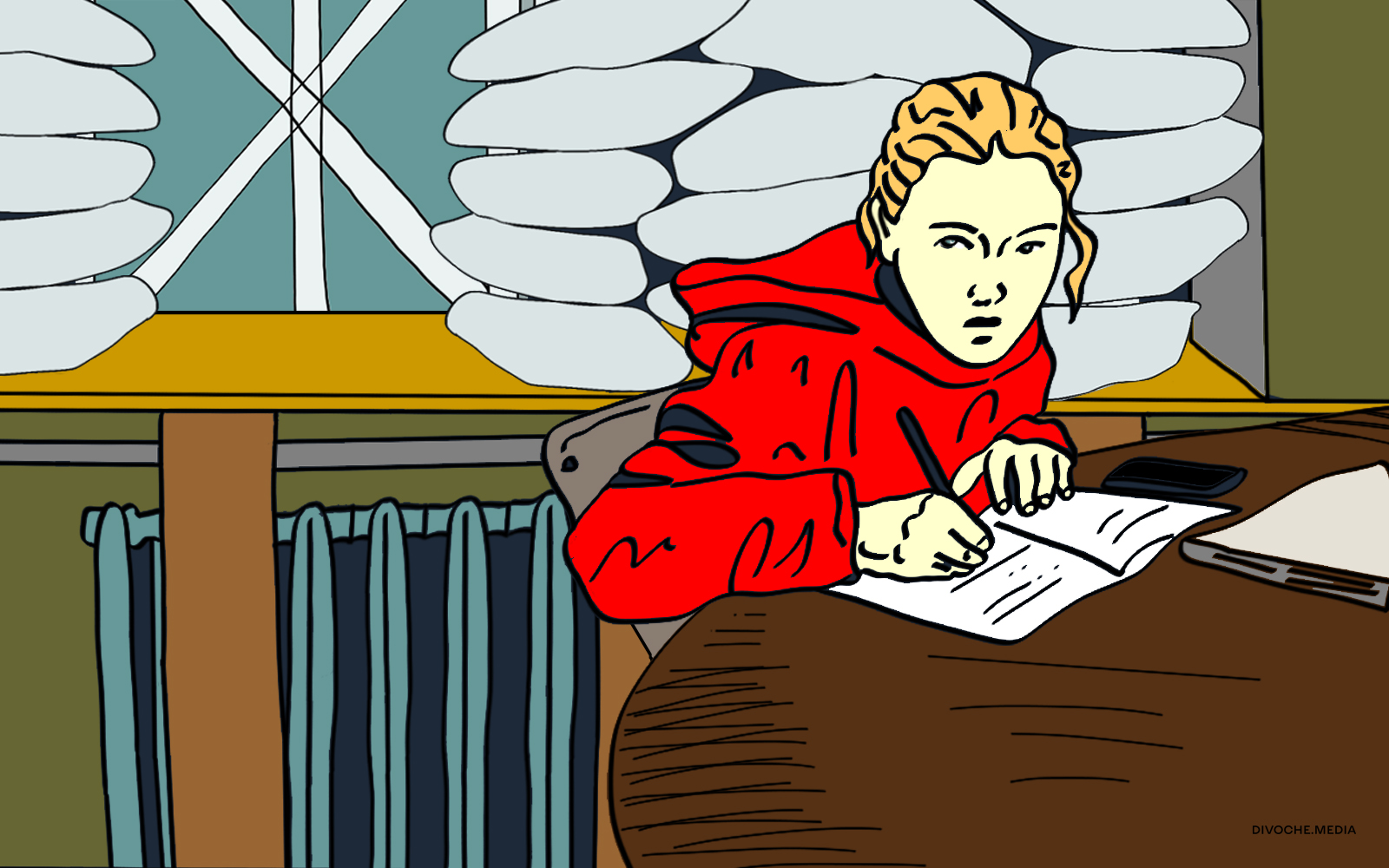
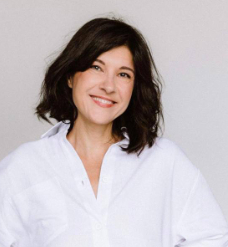
Olesya Bozhko is the head of "Space of Knowledge", a Ukrainian NGO helping children to receive high-quality free education and supporting women educators who lost their jobs due to the war. Bozhko is one of 17 women activists and civil society organizations (CSO) representatives working with vulnerable women’s groups, who participated in UN Women’s She Media School, a capacity building project aimed at improving women’s representation in the media. As the war in Ukraine reaches its one-year anniversary, it is essential to highlight women’s voices, particularly of those working to uphold women’s rights.
Originally published by Divoche Media.
“These days, the enemy is destroying Ukrainian critical infrastructure across the country, trying to intimidate Ukrainians, cause panic and demoralization ahead of winter. Instead, an ice rink opens in Odesa, coffee shops invite young people to newly created co-working spaces, energy workers restore electricity in a matter of hours, mobile operators reconnect half of the base stations, and American astronaut Scott Kelly urgently arrives by train to Kyiv.
The incredible vitality of Ukrainians lets the enemy know that we continue to live and work, and together we are bringing our victory closer. Particular attention is due to Ukrainian teachers, who from the first days of the war supported children and created for them a feeling of ‘normal life’.
Our education survived. In September, most Ukrainian schools opened their doors. Teachers continue to teach children, both in Ukraine and abroad. Holiday celebrations are held in schools; children support our military and volunteers with drawings; and teachers help schoolchildren to dream of a future in a free Ukraine.
Today, education is about the future. Our new generation will have to rebuild Ukraine after the victory. Educators help to explain the events that children witness, and their parents are often participants and heroes – including military personnel of the Armed Forces of Ukraine, volunteers, doctors and journalists.
Teachers teach children in shelters, in occupied territories, without light and heat, help them integrate in schools abroad, and create informal schools all over the world. Teachers are behind tens of thousands of stories, most of them are women. They have to solve issues around children’s safety on their own and remain the only link with Ukrainian education for many schoolchildren scattered around the world.”
According to journalist and writer Khrystyna Kotsyra: “We have all seen footage of captured Mariupol, when the Russians changed our letter ‘I’ to their ‘Y’ in the city name at the entrance, repainted it with their flag, brought their books to our schools, and burned Ukrainian textbooks.”
Khrystyna continues to live in Kyiv with her two children, Nina and Myron, and does not plan to leave anywhere. Children go to school, which has changed a lot during the war. In particular, in her Viber group of parents, everyone switched to Ukrainian, except for one mother: “The enemy understands that this is important. It is important what books children study and what language they speak. Russia’s aggression gave us a clear understanding that language and education are also our weapons,” says Khrystyna.
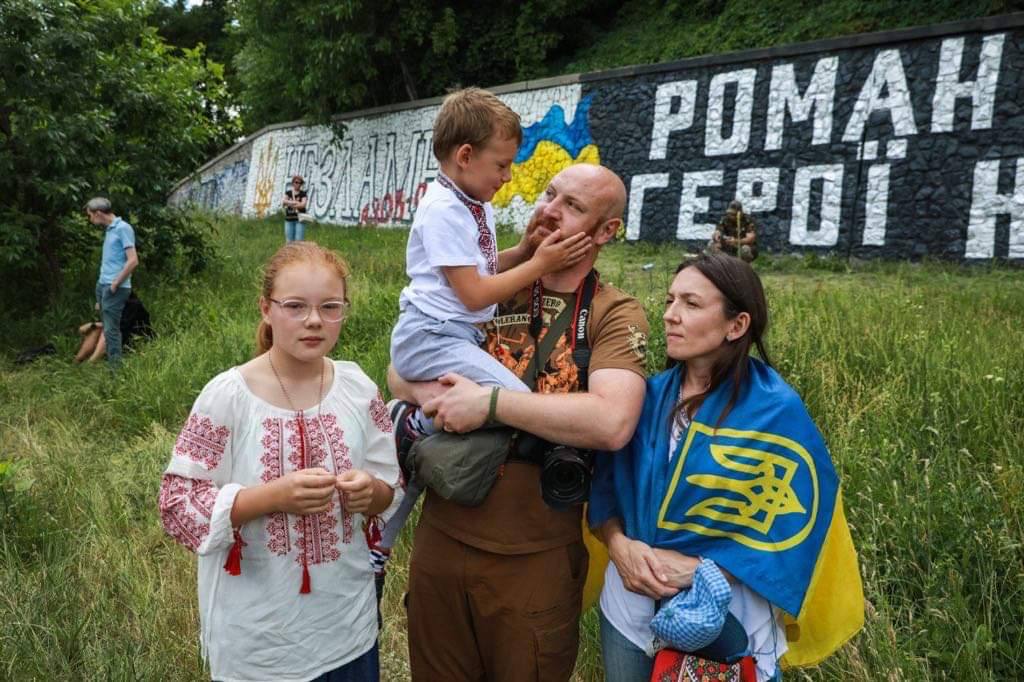
“The war has been going on since 2014. Until 24 February 2022, schools were reluctant to talk about the events in the east. A paramedic friend of mine wanted to come to her children at one of the Kyiv schools on Defender of Ukraine Day and tell her what she does, but there was such a storm. Parents were outraged that their children would be deprived of a happy childhood. They said that they should not be traumatized and involved in this. Now, of course, everything is different. It will no longer be possible to live in Ukraine and hide from the fact that there is war. You are sitting in your apartment and a siren is wailing. You have to explain what is happening to your children. Russian missiles, no matter how scary they sound, give people the understanding that language is important and that historical facts must be known in order not to fall into the same trap in the future.”
Lyudmila Pravdyvets, a primary school teacher at a Kyiv state school, remembers the first days of the war: “All I could do was send messages to my parents via Viber from the basement. I was worried about the children – whether anything had happened, whether they were all safe. I asked parents to send a plus sign if everything was fine. My class is small: 26 students.
In mid-March, our school resumed online learning. Initially, up to 15 children joined. And when all 26 finally went online, there was indescribable joy. During these three weeks, my second-graders grew up. They were now other children – with their own opinions and a clear understanding of what was happening.
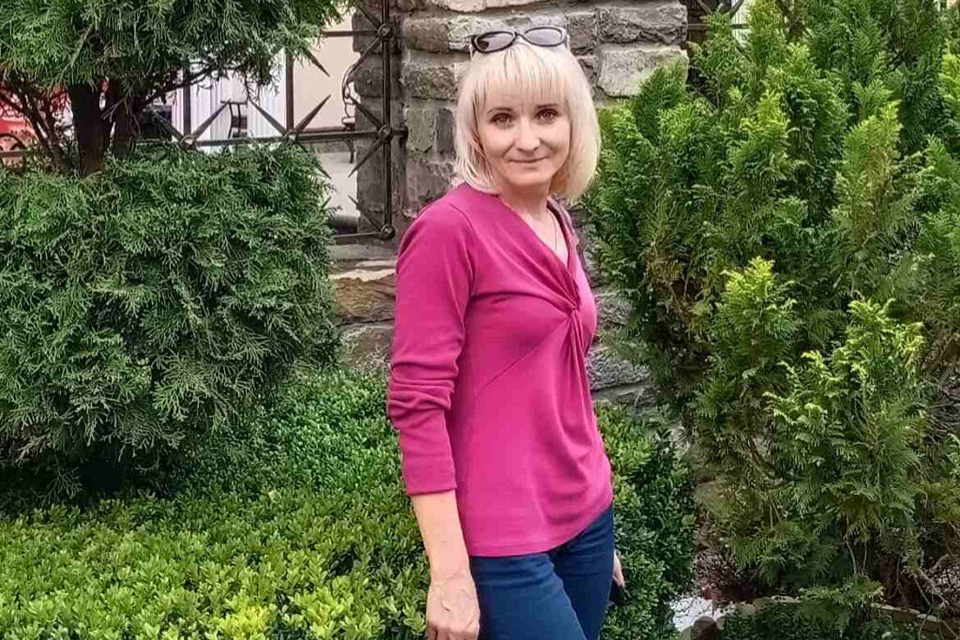
In the spring, most of the time we just talked to each other. I shortened the curriculum at my discretion because I understood that supporting each other is the most important thing. Had a conversation with each child. Everyone wanted to tell the others their story, about where they went, what their journey was like. Our lessons sometimes lasted up to two hours. It is necessary to listen to everyone. These conversations united us, warmed us, distracted us.”
Since September, 19 schoolchildren have been waiting for their teacher every morning at the school premises. She says the biggest challenge is to explain to children why it is important to stay in the shelter during the entire period of the air alert.
Sometimes the class spends up to four hours without full lighting. Children get tired, bored, and teachers have to use all their creativity and imagination to fill that time with something interesting for children.
“In the evening, I am so exhausted from the working day and the news that is our reality,” the teacher concludes. “I have a sister who lives in America. I ask her to tell me about their day in the evenings, about the school where her daughter studies. I am interested to know how American teachers work. And my sister gets embarrassed, and says: ‘You are at war, and here I am telling you about our life.’ But it restores, distracts, even inspires me.”
According to Anastasia, a geography teacher who left the occupied zone in the Zaporizhzhia region, students from her occupied native village of Rozhivka – the last settlement on the border of Zaporizhzhia and Donetsk regions – still covertly study online using the Ukrainian programme.
“We have children who go out into the field, catch mobile Internet, download assignments and send them for verification after some time.
We understand how scary it is now for those children who want to study but don’t have the opportunity. We know what the consequences can be for their families if the occupation authorities find out that the child is studying according to the Ukrainian programme. The village is small, collaborators quickly surrender those who do not support the occupiers. We crossed 26 enemy checkpoints and left. Humiliation, searches, upside down things everywhere.”
Anastasia recalls that she ordered her son to be silent so that nothing would happen. “However, at one roadblock, he blurted out: ‘Are these our soldiers?’ Everything has cooled down here. It’s good that the Russians didn’t hear.”
Anastasia and her family rent an apartment in Ternopil. At the beginning of September, two female principals united with a team of teachers who managed to leave and opened an online school.
Children from their village and from others that are currently under occupation – whose families were able to leave the territory controlled by Ukraine or abroad – joined the training. The school also teaches children who stayed with their parents under the occupation and go to local Russian schools.
“Even those to whom the Russians came with inspections still continue to study with us. It is hard to imagine what they are going through there. They force children to go to a Russian school, intimidate and put them under such conditions that they cannot refuse to study: the first warning is a fine of 40,000 rubles, the second is 80,000. Then, they threaten to take them to a boarding school.
We start classes at 12 o’clock in the morning so that children abroad and those in the occupied territory can join us at least partially.”
It hurts Anastasia that many teachers chose to stay and teach according to the Russian programme: “They tell the children about us, saying that we left everyone, abandoned them.”
Anastasia says her work brings her joy. When she works, she is distracted from the news and her worries. Her parents stayed behind in their house in the Zaporizhzhia region. The teacher dreams that the children from her school will be helped to buy computers or iPads. There are families with two or three children and one computer for all of them – if there is one at all. Everyone left their devices at home, fearing that everything valuable would be confiscated at the checkpoints.
Anna Yaremenko, now a first-grade teacher at an Estonian school, recalls the events of the morning of 24 February 2022: “We heard loud explosions. Our house is located in Brovary District [an eastern suburb of Kyiv]. They immediately went down to the basement, and I made organizational decisions about the school on my own. In the weeks following the start of the military aggression, we did not receive guidelines from the Department or District Department of Education on how to act and what to do. At the beginning of March, the head of the village appealed to all residents to leave their homes, because all the villages around us were captured. I packed up in a few hours and left with my son. We were sheltered by an Estonian teacher, who has been my friend for many years since an exchange of experience between our schools.”
At the Estonian school, Anna immediately started helping 17 Ukrainian children from different classes. They mainly studied mathematics, language, literature and natural science.
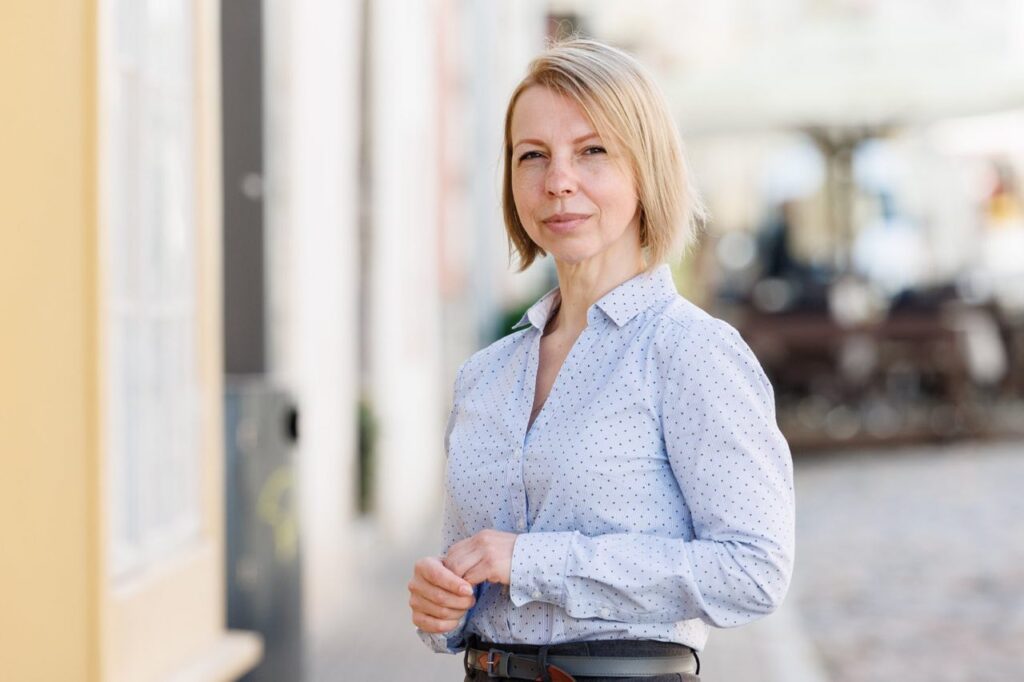
“I quickly adjusted to work on different subjects as well as with different levels and ages of children. My specialty is as an English teacher. In the summer, the management of our school in Ukraine set the condition that we had to return to Ukraine. I had to refuse, because I decided to stay in Estonia for the sake of my son, whose school in Kyiv does not have shelter, and the children are studying remotely this year.”
The management of the Kyiv school terminated Anna’s employment and did not offer to allow her to work remotely. The situation is similar for other Ukrainian colleagues who are temporarily in Estonia: everyone who decided to stay was fired. After the end of the war, no one is waiting for them in Ukrainian schools. Like many teachers, Anna currently does contract work in Tallinn.
“Salaries here for teachers are good and a teacher’s working week is 24 hours. Estonians are convinced that our educators have good professional experience, and they will find work in Estonia. There are funds ready to invest in the development and training of Ukrainian teachers, but under the condition that they learn the Estonian language and continue to work in the country.”
Since September, Anna has been teaching 14 Ukrainian first-graders under a full-time contract and salary at the same level as Estonian teachers. There are two teachers in the class – an Estonian and a Ukrainian. Anna helps more with the communication between children and teachers, and also communicates with parents.
“It is a pity that only two hours a week are allocated for the Ukrainian programme for children. Children whose parents categorically denied studying in Russian schools got into their school. And there aren’t enough such schools in Tallinn.” Anna is worried that the children are choosing the Ukrainian programme and that there are not enough Ukrainian-language books and textbooks.
Nataliya Kazachiner, a second-grade teacher at the Atlantika bilingual school in Kyiv, is convinced that work is life and stability. She has faith in the future: “Many Ukrainian schools have been destroyed. We draw with children the cities of Ukraine, the cities of the future, the cities of our dreams. We talk a lot about the courage of the Ukrainian military, volunteers and doctors. On the day of the Revolution of Dignity, we discussed how ‘dignity’ helps all of us to hold on and bring victory closer, and the world to support and admire us.
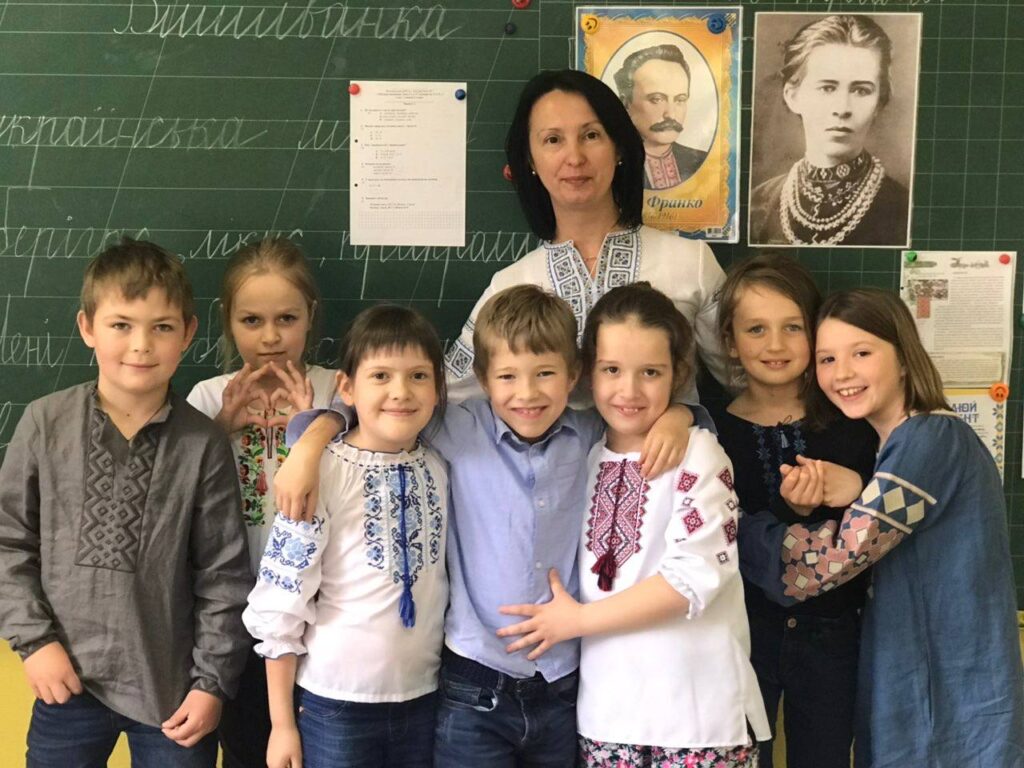
Education these days means learning to talk about things that are important to every Ukrainian. On the Day of Defenders of Ukraine, we studied the symbols and colours of our flags – red-black [Estonia] and blue-yellow [Ukraine]. Our children are a breath of fresh air and cheerfulness. They want to learn; they are really rooting for us to be able to conduct all the lessons. I teach children at the school premises and online in parallel. Everyone is upset when the Internet goes down due to a power outage and the lesson is suddenly stopped. I am glad to see sincere smiling faces again. With the lack of electricity, we learn to appreciate every moment together. War is in our lives every day, and you cannot hide from it.
I don’t talk much about the war with second-graders. But our conversations are about the activity of volunteer centres, the important mission of volunteers, about the contribution of each of us. I explain that my second-graders’ drawings and letters of support make our military stronger. We are all approaching victory together.
Communication with Ukraine is important for children who have gone abroad and study with us remotely. Their childhood dream is to return to their homes, school and friends – and that everything will be as it was before 24 February.”
Nataliya did not leave Kyiv during the long months of war. During the massive rocket attacks on 10 October in Kyiv, she was on her way to school on Saksaganskyi Street. She wants teachers to be guided in advance on how to act, and not just when something happens: “Everyone took air alarms lightly. Parents sent older children to school alone during air raids, and teachers also did not have clear instructions on what to do if an air raid got in the way. On that terrible Monday, it was necessary to bring children and teachers to their senses about what they heard and saw. The very next day, a Tuesday, the school immediately issued clear instructions to parents and teachers, in which they forbade leaving the house, taking children from shelters or moving around the city in the event of an air alert. Only at the end of that week, official detailed instructions were published on the official websites of state authorities.”
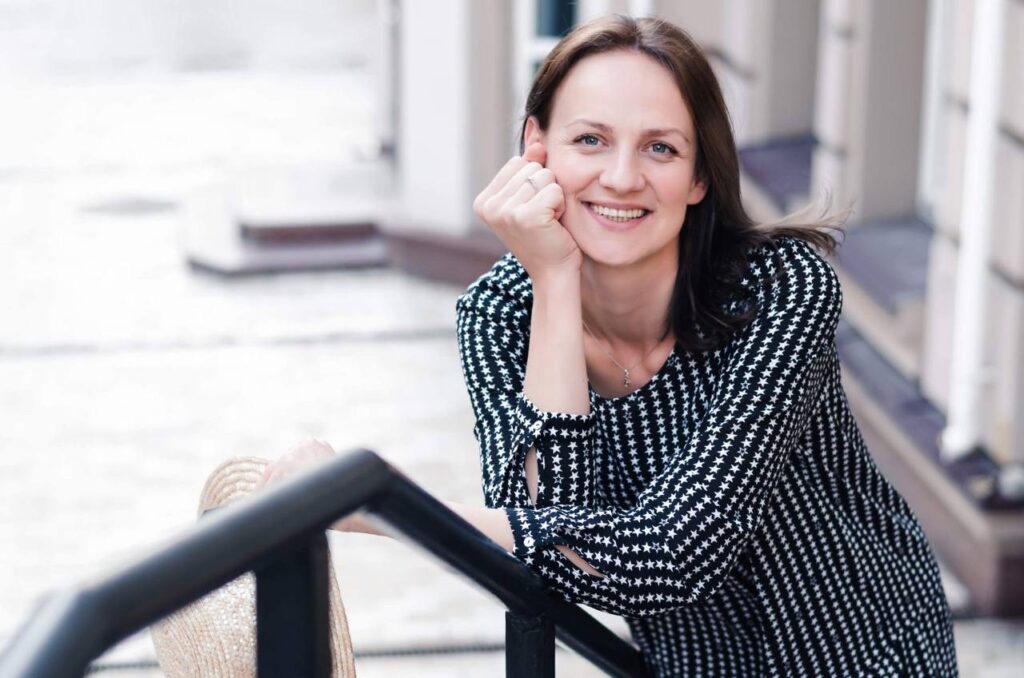
According to school psychologist Yulia Ulyanova, during war, teachers take on an even greater responsibility for children’s emotional state, mental health and life, which goes beyond merely meeting academic standards. After a busy day or hours spent in the shelter with the children, they forget to take a break and take care of themselves.
The psychologist believes that educators do not often dare to admit that they need psychological support, help, an opportunity to recover and to be able to switch off. “This is considered a sign of weakness, and our teachers have always been distinguished by the ability to quickly gather themselves and master a situation,” Yulia explains.
“The mission of educators in times of war is to show that there is stability, at least in this part of children’s lives. The fact that children can turn to their teacher with their feelings is also about stability. But in order to create and provide balance for children, it is important to take care of yourself. It’s like in an airplane, you must first put the oxygen mask on yourself and make sure that you control the situation before putting a mask on the child next to you. Our teachers are used to solving many issues, working overtime, taking on a double workload. I would really like all those responsible for education to help provide psychological support to teachers as much as possible. And the teachers, accordingly, did not hesitate to apply for, or to accept this help.”
The She Media School is implemented within the project “Transformative Approaches to Achieving Gender Equality in Ukraine” funded by the Government of Sweden jointly with Jnomics Publishing and Stockholm School of Economics in Riga and in partnership with the Office of the of the Deputy Prime Minister for European and Euro-Atlantic Integration.
The opinions expressed in this article belong to the author only and do not necessarily reflect the opinions or positions of UN Women.